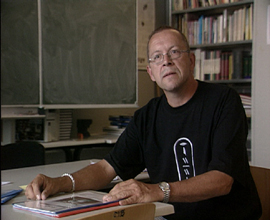The Price of Survival
Louis van Gasteren
Niederlande 2003

|
" Arsenal 06.02. 19.30 |
technischeProduktion + Weltvertrieb: Spectrum Film
Kloveniersburgwal 49, NL-1011 JX Amsterdam
Tel.: (31-20) 624 19 21, Fax: 625 35 01
E-mail: 4cent.nedjap@wxs.nl
Buch: Louis van Gasteren
Kamera: Gregor Meerman
Ton: Jacqueline van Vught
Schnitt: Daphne Rosenthal
Format: DigiBeta, Farbe
Länge: 56 Minuten
Sprache: Niederländisch, Deutsch
In 1969/1971, Louis van Gasteren made Now Do You Get It Why I Am Crying? about a former concentration camp survivor. The Price of Survival can be regarded as a sequel and looks at the family since. It is a disconcerting portrait of a father with post-traumatic stress disorder who passes on his camp experiences to his wife and children. Interviews with the widow and the youngest son alongside letters from two other children help sketch their upbringing. The director of the Sachsenhausen Memorial discusses trauma and its effects. The film also looks at the bond maintained by regular visits to the camp and intensive contacts with fellow former inmates, and at the way the wife and children identify so much with the father’s suffering that they have nighmares about a camp they were never in. Louis van Gasteren: "This film is about the effects on the family of what is now known as post-traumatic stress disorder or PTTD. The concentration camp syndrome of the 1960s and 1970s forms part of this syndrome. This means that the subject of the film will be familiar not only to families whose fathers suffered from concentration-camp syndrome. A Chinese woman recognised what happened to her after Mao Tse Tung’s Cultural Revolution. The wives of veterans recognise the fact that their husbands often consider contact with their fellow veterans more important than their family. In addition, the wives often feel they do not belong when the old comrades meet up. Parents have continually burdened their children with the past. And there are also parents who remain silent. But the pressure and burden remain."
Louis van Gasteren, geb. 1922 in Amsterdam. Ausbildung als Tontechniker. Seit 1952 mehr als achtzig Filme und Fernsehreportagen, u.a. Verstehst du jetzt, warum ich weine? (1969), Hans Life Before Death (1980), All Rebels (1980), Beyond Words (1997), In Japanese Rapids (2002).